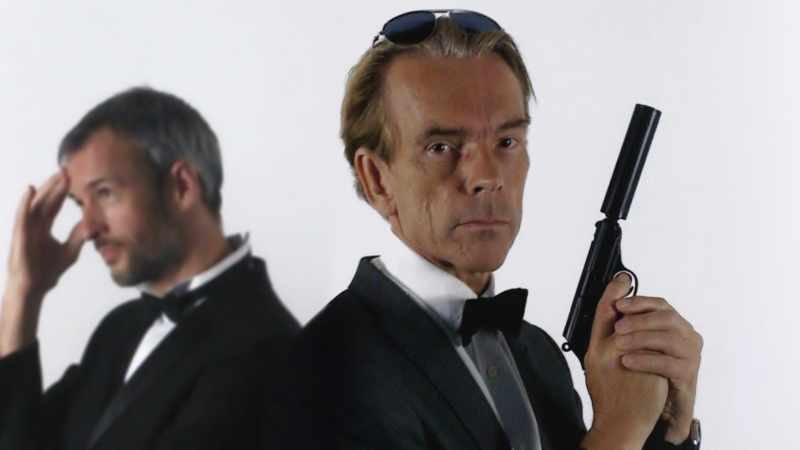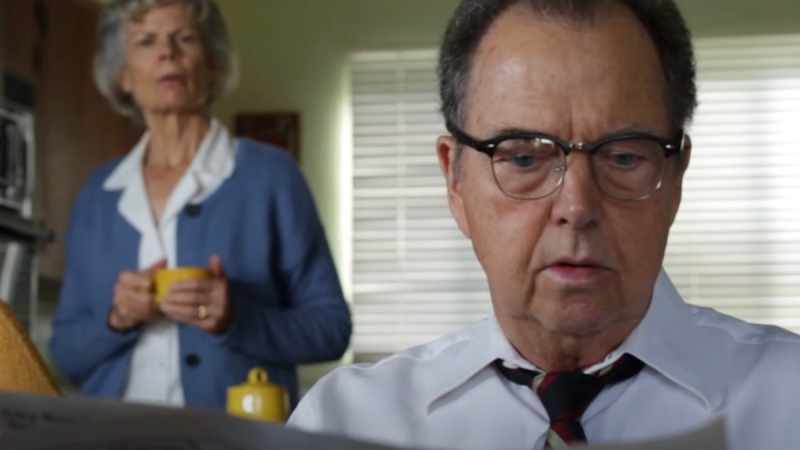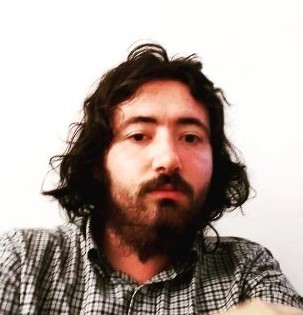




Australian-born director Matthew Bauer’s The Other Fellow (2023) is a lively documentary that looks at real men who go about their day to day lives under the name James Bond. From the reluctant participants, to the people who adopted the name, Bauer interviews them all, and offers viewers a portal into a strange reality on this planet we live on. The film went on to win Documentary of The Year at the Bond Community Awards, offering a novel insight into the world of James Bond.IEoghan Lyng described the documentary as “the most engaging Bond film since Skyfall [Sam Mendes, 2012]”, which amused the director. In this interview, Bauer explains his process as both a filmmaker and a creative thinker, and offers an insight into the James Bond series as an entity. Agreeing to a phone interview, Bauer went on length to talk about the many Bonds he met. One of them, incidentally, was a man from Ireland. The Other Fellow will stream from January 4th on ITVX.
…
.
Eoghan Lyng – Watching the documentary, I was amazed that nobody had directed one like this before. Was this the impetus for the documentary?
Matthew Bauer – I would describe it as “surely someone has done this”, and when someone hadn’t, I thought it was worth pursuing. A lot of the people in the documentary, as you know, have been asked to do commercials, and asked to do lots of other things. So, we started off exploring that. No one had said it was a feature film – but the stories we found got us there.
EL – What was the general consensus you gleaned from the people you interviewed?
MB – A lot of them would say the same thing : “It’s a blessing and a curse.” Which was nice to know that there are good things that come with being named James Bond. More of them say the world thinks it’s a blessing,when it’s really a curse. Of course, with the Swedish James Bond, it was all about the positives.
EL – How long did it take to execute the film, from beginning to end?
MB – Nine years in total – from beginning to end. So, it was my first film out of film school. I was told that it takes seven years on average for documentaries. Probably a little smaller in the age of digital. But at the beginning I remember thinking, “God, these people don’t know what they’re doing” [chuckles]. But it did take a lot of time to research, and we would often have to wait a year for someone to film. I mean, we could have released a really bad documentary five years ago. But it was my first film, and I wanted to get it right. I didn’t want to rush my first feature – you only ever get one chance! I saw some people rush their first film, straight out of school. Documentaries take time, especially on a smaller budget.
EL – Ian Fleming was a clever writer, and one I think was undervalued by his critics. You used footage of him – what is your opinion of the writer?
MB – I like the way he comes across in the film. Fleming was quite playful in his own way- he’d steal names for his books all the time. And it wasn’t just James Bond, which of course he got from the book [Birds of The West Indies]. He got the name Goldfinger from the architect Ernő Goldfinger. Well, Fleming hated Goldfinger’s buildings, and controversially, named the villain after him. So, it was quite a playful way of doing that. I’m a Fleming fan. Some people, such as the Swedish James Bond, modelled themselves on the Fleming lifestyle, but that can lead one to an early grave with the smoking and the drinking. That was the case for Fleming. But a lot of 20th, 21st century men have modelled their lives on him. I like the quote that was referenced in No Time To Die – “’I shan’t waste my life by trying to prolong it.”
EL – No Time To Die (Cary Joji Fukunaga, 2021) divides Bond fans. I personally think the Daniel Craig era started well, and stumbled with the last two films. Tell me what your view is.
MB – As you said in your review, my film is the best Bond since Skyfall, so that’s that [laughs uproariously]. But the ending of No Time To Die … A lot of people didn’t like it, but I thought it was fantastic killing Bond. I thought it was an amazing thing to witness in the cinema. There were other stuff in that film that didn’t make any sense. If there was that blood virus they created, why were there people in the water? Why was there the garden in that building? I didn’t understand why. If you’d told me years ago that “Spectre [Sam Mendes, 2015] was behind everything” and “they were going to kill Bond ”, I would have said it was the best Bond fan fiction around. But in killing Bond, I think I would have preferred it in a John Le Carré kind of way – a spy thriller way. Instead, we got the killer virus from a deus machina kind of way.
EL – Did you interview any Bond connoisseurs?
MB – No, most of my characters avoid people like the plague [giggles]. They’re not familiar with The Man With The Golden Gun. They’re not haunted by the films per se, but by the incessant coverage of Bond. James Bond is that ubiquitous. The best summary I can think of is from the New York James Bond who said “sequel was a new form in the 1960s “. These days, we are so accustomed to franchise and follow up films. The death of James Bond has been speculated for years. People said when Sean Connery left, “That’s the death of Bond.” After Licence To Kill [John Glen, 1989], it was “The death of Bond.” After Die Another Day [Lee Tamahori, 2002], it was “The death of Bond.” This thing can’t go on forever, they felt.

EL – Sherlock Holmes has shown that these things can go on forever. It went from book, to theatre, to radio, to cinema..
MB – Yes, that’s the other one. Maybe Sherlock, Bond and Tarzan. But it is something that these Bond families have to think about. The London James Bond compared them to the Bourne families. Well, they think, “There’s what? Four Jason Bourne films.” Bond has much more, but for Bond families. And the first someone tells them when they have a son is, “You’re going to call him James”.
EL – It’s what I would do.
MB – Yeah! But it’s most common in American families – it’s the first thing that comes to mind. And a lot of them go with it.
EL – How many men are named James Bond? One hundred?
MB – I don’t know how many there are. We contacted about one hundred, and a lot of media outlets have said it’s something like that, but I honestly don’t know. I would guess tens of thousands!
EL – Fleming himself was contacted by the man whose name he took. What do you know about that?
MB – I think everyone knows about the ornithologist – very much in the lore. I think these days every James Bond fan knows that. What happened to that Bond? Turned out quite a lot happened. The BBC interviewed him to ask what had happened in about 1965, so he was interviewed, along with his wife. We got to see BBC World Service Interviews and bring it to life in our documentary.
EL – Did President Kennedy help popularise the James Bond series in America?
MB – Yes, he made it a more known quantity when he put it in his 1963 list of favourite books. We actually considered putting in a sequence set in The White House. We considered a re-enactment, but ultimately decided against it. As it happens, there are a lot of American Bond fans.It’s not the craze as it is in the UK, but there are a lot of fans.
EL – I wonder why that is?
MB – Americans are obsessed with Princess Diana and that kind of thing. They enjoy British culture. But there is a difference between them and British readers. They read Bond and don’t get that it’s all meant to be a big joke, like it’s seen in the UK.
EL – On that note, I probably shouldn’t mention that my favourite Bond is Timothy Dalton, who brought reality to it. He’s the only one who could play Le Carré as well as Fleming.
MB – Dalton was wonderful. Licence to Kill isn’t just one of the most underrated Bond films, but one of the most underrated films of all time.
EL – Agreed.
MB – Dalton actually met a real James Bond. As you know in The Living Daylights, they filmed the opening scene at the Rock of Gibraltar. As it happened, an officer named James Bond was stationed there. So, they wheeled him out for a photo with Timothy Dalton. He might be the only actor to meet a real James Bond.
EL – That’s remarkable.
MB – Yeah, I sent him all these letters. They went unanswered, so I drove down to meet him. His wife basically chased me away. But in a way, I can understand that. It was in the media – outlets like The Daily Mail. He was a private man, and probably didn’t want to do the photo, but his army buddies made him do it.
EL – Although he isn’t the most popular Bond among fans, Pierce Brosnan nevertheless is something of a national icon in my native Ireland. As an Australian, do you think the same applies to George Lazenby?
DM – I think there has been a change of opinion towards Brosnan. The last two Craig films led to a comeback, I feel. It’s interesting, because you can easily see him in The Living Daylights, a film that was originally written for Brosnan. With Lazenby, I think he’s something of a trivia question in Australia. It’s, ‘Oh yeah, an Australian played Bond.’ To his credit, he comes across as a real ‘Australian Australian’, and seems to be one of the genuine ‘Australian Austrlians’ out there. I think I like the film On Her Majesty’s Secret Service [Peter R. Hunt, 1969] more than him. Twenty years ago, On Her Majesty’s was something of a lost curiosity, but over the years it’s been elevated to the top. Deservedly so too, because it just might be the best film in the series. Lazenby has a curious reputation, and he has made openly homophobic, racist and misogynistic comments in interviews. You could say that is the stereotypical trait of a ‘traditional Aussie bloke’ but it makes for a curious opinion worldwide.
EL – You’ve mentioned an American James Bond and a London James Bond. You didn’t discover an Irish one, did you?
MB – I did meet an Irish James bond actually. Are you familiar with a programme called ‘Newstalk with Moncrieff’? I did an interview with Sean Moncrieff. Well, anyway, I did meet one in Ireland, but we couldn’t use him in the end because it was a standard story. But he’s on Facebook, and he’s an Irish rugby player.
EL – Talk to me about the Swedish Bond – that’s not his birth name, is it?
MB – No, that was an interesting story. The Swedish Bond was the son of a German officer. Like a lot of German officers after the war, his father returned to Germany for a bit, and never returned. So, this man discovered the Fleming books, which are Post War stories. In that sense, the Swedish man saw similarities with his father, although he was on a different side. So, he saw Fleming as a sort of surrogate father, and modelled himself on Bond. Eventually, he changed his name to James Bond. At first, this was something I wanted to avoid, but because so much of the documentary was about the negativity of carrying the name, we needed the balance and have someone who positively chose the name. We needed that counterbalance for the documentary.

EL – Have you had feedback from EON, or other Bond affiliates?
MB – From EON productions? Absolutely nothing…..But I did have a screening that featured Daniel Craig’s brother in the audience.
EL – Now, that’s a story.
MB – Obviously, Daniel Craig’s brother has a different version. He came to a screening in Oswestry.We’d had the UK premiere where Naomi from The Spy Who Loved Me [Lewis Gilbert, 1977] and the actress who played Fiona Volpe (Luciana Paluzzi) attended. Anyway, a James Bond from Oswestry came to me to arrange a screening in his town. He was a sports reporter, and was the head of the Oswestry film society. He said we could have a screening in Oswestry, where Craig’s brother lived. So who knows? Maybe the brother mentioned it to Daniel and Rachel Weisz over Christmas!
EL – What has the response been from Bond fans?
MB – Mark O’ Connell was involved with the film. I think he’s credited as “Consulting Producer”. Although I am a big Bond fan, I’m not connected to the sphere as he is. He did a lot of PR stuff – he knows all the fans! Do you know of this YouTuber called David Zaritsky? Mark alerted him, and alerted Calvin Dyson to go along to the premiere. You may know that the Bond Community Awards is happening tonight, and is happening in a bar in New Jersey. And we have been nominated for Best Documentary. So, that’s very flattering that the Bond fans nominated us.
EL – It’s certainly a unique documentary.
MB: Thank you. I kind of wanted to do something that was different. I loved those Patrick McNee documentaries when I was a kid, but I think these days every fan knows that Dr.No director Terence Young was a “real life Bond.” This wasn’t a documentary about the making of, say, Moonraker [Lewis Gilbert, 1979]. But we did feature moments such as the Swedish Bond who appeared on the set of Spectre. We had that scene of him following Daniel Craig who was filming a scene for his Bond.
EL – Finally, how would you market this film to people who are between two minds about this film?
MB – I follow the Seinfeld mantra a bit of “no hugging no learning”… but more seriously, I think it’s a reflection of the internet age. In today’s society, there’s a lot of talk on how we make judgements on appearance, race and gender. Well, this is about how judgements are made based on names. You know the way you type your name into gmail and you can’t have it..
EL – Luckily, I’m the only Eoghan Lyng I know of. I don’t think I have that problem.
MB – Ha ha! But you know how it is. I typed my name into Instagram, and found another account with the same name. It was a profile someone set up in 2009, and used once. That’s often the way. And when you have an extreme name like James Bond, it can make life harder on the internet. Obviously, this documentary is not as important as children starving in Africa, but it does make comments on how we live in the world, and how we make perceptions about other people.
…
.
Matthew Bauer is pictured at the top of this interview (snapped by Jamie Touche); the other two images are stills from The Other Fellow
















